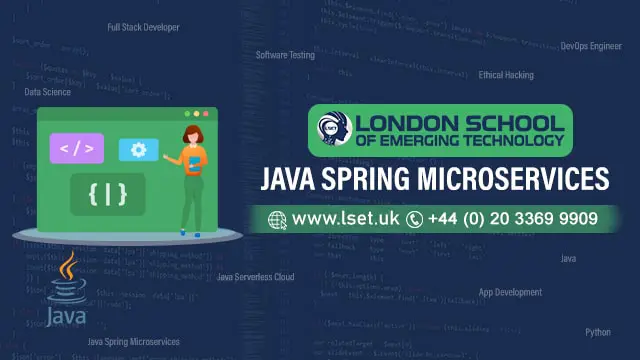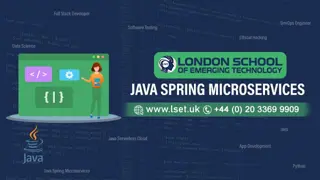
Java Spring Microservices - Instructor-Led Online Live
Microservices is a widely used development paradigm in the recent time.
London School of Emerging Technology
Summary
- Certificate of completion - Free
- Exam(s) / assessment(s) is included in price
- Tutor is available to students
- TOTUM card included in price What's this?
- Job guarantee programme is included in this course
Add to basket or enquire
Overview
Java Spring Microservice course introduces you to the Microservices architecture. You will learn to use Spring technologies to build scalable, fault tolerant, and secure microservices. This course will also help you to develop a microservice mindset which focuses on building small, self-contained, and ready to run applications. As part of the course, you will learn Spring Boot, Spring Data, REST, JSON, ORM tools like Hibernate, Spring Cloud which offers service discovery, load-balancing, circuit breaking, distributed tracing, API gateway, and monitoring. You will learn how to develop an event-driven system which consumes and produces events from your microservices in real-time.
You will learn how to build REST interfaces and create repositories, DTOs, services, and controllers. You will use Spring Cloud Config to implement centralized versioned configuration and learn about dynamic configuration updates with Spring Cloud Bus. This course will also cover the deployment cycle, CICD pipeline, docker, and Kubernetes. You will get familiar with the best practices and use the development paradigm used in the industry. This will prepare you very well for your next job as Java Microservices Developer or Java Backend Developer.
Technologies Covered
Spring Boot: Spring Boot is an open-source Java-based framework widely known to create Microservices. It simplifies the creation of stand-alone, production-grade, ready to run Applications with minimal efforts.
Spring Cloud: Spring Cloud provides tools to build some of the common patterns like configuration management, service discovery, circuit breakers, intelligent routing, micro-proxy, control bus, one-time tokens, global locks, leadership election, distributed sessions, and cluster state in distributed systems.
Spring Cloud Security: Spring Cloud Security provides necessary functionality to build secure applications and services with minimum hassle. Spring Cloud Security can be configured externally or centrally. This helps to build large scale complex applications with remote components. With Spring Cloud Security, you can easily implement common patterns like single sign on, token relay and token exchange.
Docker: Docker enables to develop, ship, and run applications with minimal efforts. It allows us to separate our applications from our infrastructure which help in speeding up the software delivery. Docker helps to package and run an application in a loosely isolated environment called a container. We can run many containers simultaneously on a single host. Containers are lightweight and contain necessary configurations and libraries to run the application. We can easily share containers which can run on any server.
Kubernetes: Kubernetes is an open-source platform which help us managing containerized workloads and services. Kubernetes is portable and extensible which simplifies both declarative configuration and automation.
Job Guarantee (Optional Add-on Programs)
Job Guarantee is an add-on program you can register with this course. You will need to clear an assessment interview to get enrolled. Once successful in the assessment, you will be offered Job Guarantee with this certificate course. There is a fee to join this program as it takes you to rigorous career development, interview preparation, mock interviews, etc. The fee for joining the Job Guarantee add-on program is £500. This is a 12 months program which starts at the end of your certificate course. As part of this program, we represent you to the prospective employers and train on career development elements You need to abide by the rules of this program which you can find on the Job Guarantee page. If we can’t find you a relevant job or you don’t find it by yourself in the similar industry in any part of the world within these 12 months, we will refund you the course fee + Job Guarantee program fee. The refund process will start after the end of the 12 months and every month we will pay £500 until the entire fee is paid back. But if you find a relevant job during this time then the remaining payments will be stopped. This program is only applicable to home students (UK permanent residents / citizens).
Course media
Description
Course Highlights
Hands-on Sessions
Project-based Learning
Live or Offline Capstone Project
Real world development experience
Industry Mentors
Interactive Teaching Methodologies
Evaluation Criteria
18 Coding exercises
5 Assignments
5 Quizzes
Capstone Project
Group activities
Presentations
Assessment Criteria
To earn the certificate, students must clear all the assessments, quizzes, and project work. At a minimum, students are required to satisfy the pass criteria of the course. Students who score 75% or more will be awarded Merit Grade, while students with 85% or more will be awarded, Distinction Grade.
Following are the detailed criteria for each level
Pass Grade Criteria
Score minimum 50% aggregate and demonstrate the following;
Proficiency in the technical skills and techniques
Must have a minimum attendance of 90% in the classes unless proper medical proof is provided
Submit all the projects and assignments before the last submission date
Collaborate with peers in group projects
Merit Grade Criteria
Score minimum 75% aggregate and demonstrate the following;
Excellent technical skills and techniques
Discover and apply strategies to find the perfect solutions
Select/design and apply appropriate methods/techniques
Present and communicate appropriate findings
Distinction Grade Criteria
Score minimum 85% aggregate and demonstrate the following;
Mastery of technical skills and techniques
Use critical thinking for self-evaluation and justify valid conclusions
Take the responsibility the manage and organise activities and teams
Showcase convergent/lateral/creative thinking.
Why Learn Spring Boot and Microservices?
Java application development becomes fairly simpler with the help of Spring Framework.
Spring Boot effectively removes all problems related to dependency management, bean declaration, configuration, etc.
By learning Spring Boot, you can focus more on the application logic instead of worrying about dependency management and configuration.
Companies are searching for Java developers with Spring Boot experience.
You will be able to reduce the time spent on developing and increase your overall effectiveness.
About the Course
Get a proper introduction to Microservices, Spring Boot, and Spring Cloud. After completing this Course, you will be able to build cloud-based, fault-tolerant, and scalable enterprise applications by using microservices.
Participants will learn the development of enterprise-level applications by using a microservices architecture.
LSET will provide the participants with deep insight into Spring Boot.
Through a very interactive project-based learning approach, the participants will work with some real-world projects and assignments.
LSET will provide live mentor support and structured training to help students improve their coding speed and efficiency.
The Course classes are provided by industry experts who have years of experience with Spring Boot and Microservices.
Reasons to Choose LSET
- Interactive live sessions by industry experts.
- Practical classes with project-based learning with hands-on activities.
- International learning platform to promote collaboration and teamwork.
- Most up-to-date course curriculum based on current industry demand.
- Gain access to various e-learning resources.
- One-to-one attention to ensure maximum participation in the classes.
- Lifetime career guidance to get the students employed in good companies.
- Free lifetime membership to the LSET Alumni Club
Complete Learning Experience
This course provides a hands-on, guided learning experience to help you learn the fundamentals practically.
- We constantly update the curriculum to include the latest releases and features.
- We focus on teaching the industry's best practices and standards.
- We let you explore the topics through guided hands-on sessions.
- We provide industry professional mentor support to every student.
- We give you an opportunity to work on real world examples.
- Work with hands-on projects and assignments.
- We help you build a technical portfolio that you can present to prospective employers.
What Will Be Your Responsibilities?
- Work creatively in a problem-solving environment.
- Ask questions and participate in class discussions.
- Work on assignments and quizzes promptly.
- Read additional resources on the course topics and ask questions in class.
- Actively participate in team projects and presentations.
- Work with the career development department to prepare for interviews
- Respond promptly to the instructors, student service officers, career development officers, etc.
- And most importantly, have fun while learning at LSET.
Skills You will Gain
- Spring Framework
- Web Technologies
- Containers
- ORM
- Testing
- Version Control
- Data
- Code Quality Tools
- CICD and Build Tools
Benefits of LSET Certificate
Earning the LSET Certificate means you have demonstrated hard-working capabilities and learnt the latest technologies by completing hands-on exercises and real-world projects.
Following are some of the traits employers can trust you have built up through your course;
- You know how to work in a team environment and communicate well.
- You know the tools which are necessary for your desired job.
- You know how to use the latest technologies to develop technologically advanced solutions.
- You have developed problem-solving skills to navigate complex problem scenarios and find the right solutions.
- You are now ready to take on the challenge and help your prospective employer to build the desired solutions.
What to expect after completing the course?
After earning your certificate from LSET, you are entitled to join the LSET’s Alumni club. There are countless benefits associated with the Alumni Club membership. As a member of LSET Alumni you can expect the following;
LSET to hold your hand all the way to find a successful career
Advice you on choosing right career based on your passion and goals
Connect you with industry experts for career progression
Provide you opportunities to participate in events to keep yourself updated
Provide you an opportunity to contribute to the game changing open source projects
Provide you a platform to shine by giving you an opportunity to speak at our events
How Does Project-Based Learning Work?
LSET project-based learning model gives students an opportunity to work on the real-world applications and apply their knowledge and skills gained in the course to build high performing industry grade applications. As part of this course, students learn agile project management concepts, tools, and techniques to work on the assigned project in collaborative manner. Project work is done individually by each student but they are encouraged to enhance their solution by collaborating with the teammates.
Who is this course for?
Prerequisites have been met
Option 1
- Topic: Java Spring Microservices (Prior Knowledge of Java Required)
- Add-On:
- Duration: 3 Months
Option 2
- Topic: Java Spring Microservices (Prior Knowledge of Java Required)
- Add-On:Project
- Duration: 5 Months
Option 3
- Topic: Java Spring Microservices (Prior Knowledge of Java Required)
- Add-On: Project &Industrial Training and Paid Internship Program
- Duration: 12 Months
Prerequisites have not been met
Option 1
- Topic: Java + Java Spring Microservices
- Duration: 4 Months
Option 2
- Topic: Java + Java Spring Microservices
- Add-On:Project
- Duration: 6 Months
Option 3
- Topic: Java + Java Spring Microservices
- Add-On: Project &Industrial Training and Paid Internship Program
- Duration: 13 Months
Note: Our Industrial Training and Internship program includes a guaranteed 6 months paid internship (from 10 hours to 40 hours per week) with a technology company. Due to visa restrictions, some international students may not be able to participate in this program.
Who Should Apply for this Course?
Java professionals who want to improve their coding skills with new techniques
Java learners who want to improve their speed and efficiency by learning java
Java learners who want to enhance their portfolio with new skills and projects
Learning Objectives
Learn to build scalable, fault tolerant, and secure microservices
Get familiar with the technologies involved in developing microservices
Build REST APIs and other essential layers
Learn to build docker images
Learn to orchestrate microservices with Kubernetes
Learn to monitor RESTful Services with Spring Boot Actuator
Learn essential tools to build microservices like Spring Cloud, Spring Boot, etc.
Requirements
- Prior knowledge of Java is required Or Java Programming Certificate
- Prior knowledge of HTML, CSS, and Javascript is required Or Front End Development Certificate
- Basic Understanding of English
- Basic Proficiency with Computers
- Ability to work in Group
Career path
- Java Microservices Developer
- Java Web Developer
- Java Architect
- DevOps Engineer
- Java Enterprise Developer
Questions and answers
Hi, I am looking to enroll in this course. I have the prerequisites required for it. When would the next batch start, what is the selecteion criteria.
Answer:Dear Dolly, Thank you for contacting the LSET. Our next intake is in May 2023. Please visit our course page on lset.uk website to know more about the selection criteria. Thank you, LSET Admission Team London School of Emerging Technology
This was helpful.Hello. I live in Turkey. Can I take this course? Can I work as a home office in a UK company while in Turkey? Do you help with work?
Answer:Dear Obay, Thank you for contacting the London School of Emerging Technology. You can certainly take our Java Spring Microservices course online. We offer online instructor-led courses so you can easily interact with the instructor and other students. To work in the UK, you must have a valid work visa. And unfortunately, we cannot advise you on any immigration matters. Please let us know if you have any other questions about our courses. Thank you, LSET Admission Team
This was helpful.
Certificates
Certificate of completion
Digital certificate - Included
Reviews
Currently there are no reviews for this course. Be the first to leave a review.
Legal information
This course is advertised on reed.co.uk by the Course Provider, whose terms and conditions apply. Purchases are made directly from the Course Provider, and as such, content and materials are supplied by the Course Provider directly. Reed is acting as agent and not reseller in relation to this course. Reed's only responsibility is to facilitate your payment for the course. It is your responsibility to review and agree to the Course Provider's terms and conditions and satisfy yourself as to the suitability of the course you intend to purchase. Reed will not have any responsibility for the content of the course and/or associated materials.



